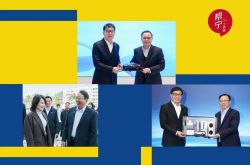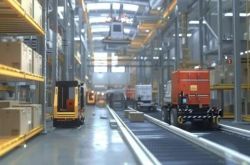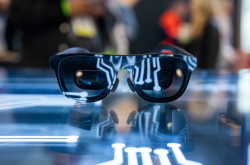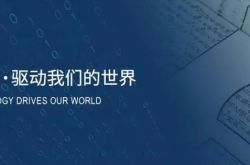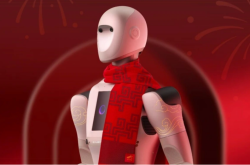Does Neusoft's 'Big Move' Make Sense?
![]() 06/25 2024
06/25 2024
![]() 632
632
As an established software giant, Neusoft's performance in the past two years has indeed been unimpressive.
Looking at the financial report data, in 2022, Neusoft's revenue was 9.466 billion yuan, with a net loss of 347 million yuan and a non-deducted net profit of -530 million yuan. In 2023, the group's revenue was 10.544 billion yuan, with a net profit of 70.5006 million yuan and a non-deducted net profit of -147 million yuan. Netizens on stock forums couldn't resist complaining: achieving 10 billion in revenue without making money is quite a joke.
Objectively speaking, Neusoft's financial report performance improved slightly in the first quarter of this year.
Data shows that Neusoft's first-quarter revenue broke a five-year high, reaching 1.83 billion yuan, but the profit was only 1.9068 million yuan. With over 1.8 billion yuan in quarterly revenue, a net profit of less than 2 million yuan is indeed quite low. This is still the best quarterly profit performance in five years.
Although the performance is unremarkable, equity incentives have not stopped.
On June 18th of this year, while everyone was busy shopping, Neusoft's chairman Liu Jiren, as well as Song Qingjun, Li Jun, Zhang Xiaoeu, and others, reduced their holdings by varying degrees.
Interestingly, before this round of reductions, Neusoft also issued a buyback announcement in January, with an actual buyback amount of 145 million yuan before the end of April.
If you look at the two announcements consecutively, investors might exclaim "a wise move" after reading them: with a net profit of less than 100 million yuan a year, the company directly uses 145 million yuan for buyback and cancellation, which can also be considered a significant move. The effect of buyback and cancellation is also very direct. From early February to mid-June, Neusoft's share price rose from a low of 6.28 yuan to 8.65 yuan on June 18th, with a gain of 37%.
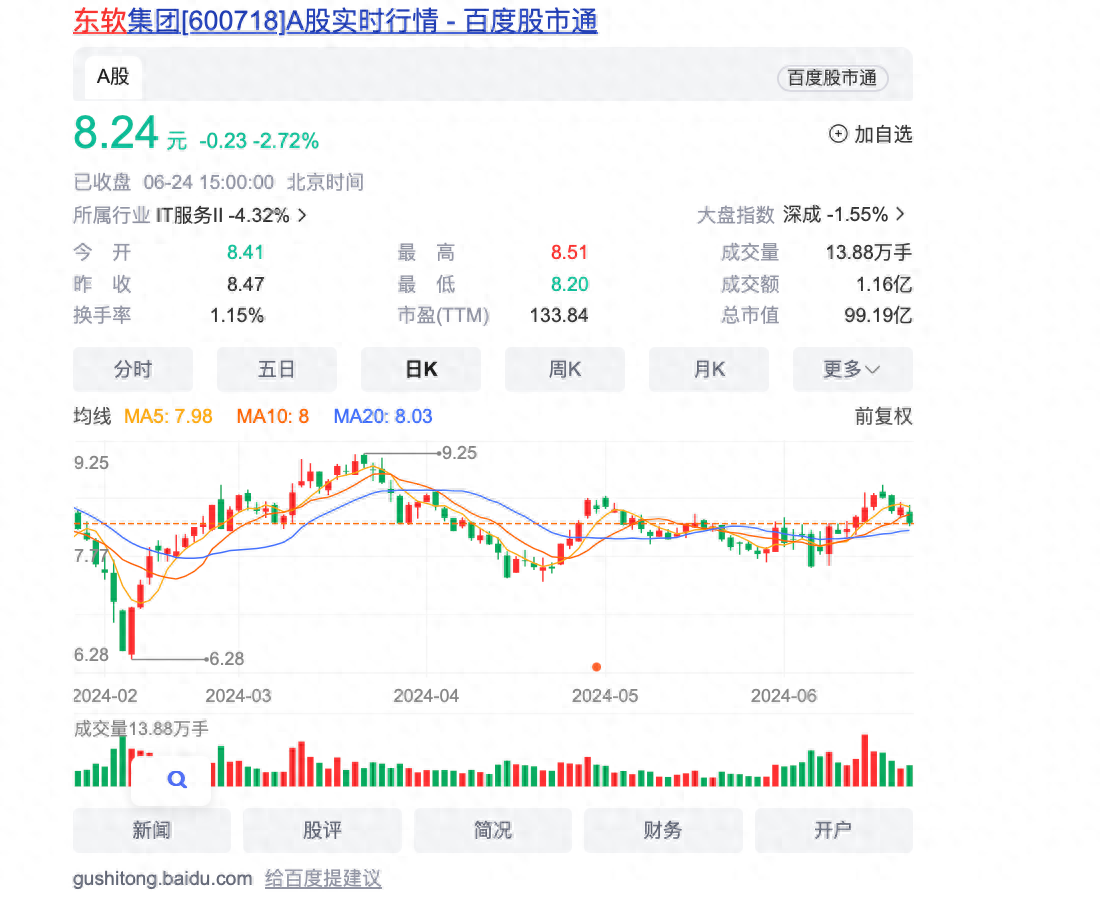
For investors, a pleasant increase in share price is a good thing, but immediately after the increase comes a wave of executive reductions, followed by a downward trend in share prices.
At this point, the buyback and cancellation to boost share prices inevitably make some investors feel that it is an opportunity for executives to sell at high prices. However, is it worth spending 140 million yuan for executives to sell? After this round of declines, will the share price rebound? These questions are worth discussing.
Why is Neusoft big but not strong?
No matter how many tricks listed companies use to distribute money, the premise is that there are profits to share. On the contrary, Neusoft's profit performance in the past two years' financial reports has not been good, with consecutive years of losses in non-deducted net profits.
In April, the company issued another announcement on asset impairment provisions, respectively accounting for 39.2244 million yuan and 8.8364 million yuan in bad debt losses for 2023. Coupled with other impairment items such as inventory, the total profit of the consolidated statement decreased by 198 million yuan.
What a mess, this impairment profit performance is even worse.
Poor profit performance ultimately stems from business. After all, Neusoft's business involves many fields, and trying to cover too much can lead to indigestion.
According to the annual report, Neusoft's business includes many areas such as smart cities, healthcare, intelligent automotive connectivity, enterprise digital transformation, and international software services. In addition, it maintains a market presence in areas such as medical insurance information systems, human social security IT solutions, and medical IT application markets, where Neusoft is also the market leader.
As a software group, Neusoft's business is large but not strong.
From the perspective of research and development, the proportion of research and development to revenue has decreased in recent years, and the internal driving force of research and development is insufficient. In terms of financial report data, Neusoft Group invested 1.065 billion yuan in research and development in 2023, accounting for 10.10% of its operating revenue. In 2018, the proportion of research and development reached 14.63%.
Although a 10% R&D ratio is a criterion for technology driven enterprises, Neusoft Group's R&D growth may not keep up.
By contrast, in 2023, the average R&D investment in the software industry accounted for 25.45% of revenue, with UFIDA R&D accounting for 32.82% and Kingdee International R&D accounting for 24.9%.
Without continuous efforts in research and development, it means that one has never been able to establish their own core barriers in technology. Lack of true technological core barriers means that there is not enough premium capability,
This is also the reason why as a software giant, Neusoft Group's ability to make money has not been very strong.
From a financial perspective, one of the reasons for not making money is the high cost of performance. According to the financial report, the balance of contract performance costs for Neusoft Group in 2023 reached 4.592 billion yuan, which includes various expenses such as direct materials and direct labor.
Interestingly, in terms of finance, Neusoft classified contract performance costs as inventory, which made the book profit look better, but also resulted in inventory accounting for 26% of total assets in 2023, with an amount of 5.154 billion.
No wonder, after all, in outsourcing development, as long as the project does not deliver costs, inventory can still be stored. However, the problem is that these inventories are difficult to convert into profits because bad debts always occur.
In the 23 year financial report, the balance of accounts receivable and notes receivable of Neusoft Group was 1.801 billion yuan. How much bad debt is there? There are 286 million. The bad debt rate is 15%. The profit margin of the business was not that high originally, and with such a bad debt, there won't be much profit margin throughout the year.
This is also a bit helpless. If the fathers of Party A don't make money, Neusoft Group doesn't have any good solutions. So, adjusted profits can only result in losses.
However, the larger the business area, the higher the cost of contract fulfillment. After product delivery, it becomes accounts receivable and then bad debts, which becomes a vicious cycle: the more revenue grows, the more severe the loss.
Moreover, the bad debts in the software industry are somewhat different from other industries. For example, in the consumer industry, some bad debts may still be recovered, but in the software industry, bad debts may actually become losses.
Because many bad debts are not due to Party A's lack of money, but because Party A is not satisfied with the quality of product delivery and simply does not pay the final payment, the order becomes a bad debt.
I remember a friend who worked at Party A once privately said that a software outsourcing factory: "The first thing that Party A does after product delivery is code reconstruction. As for the final payment, Laozi, the king of heaven, can't come."
Over time, as bad debts continue to increase, the development costs associated with operating expenses continue to increase, and software developers naturally cannot make much money.
Can intelligence satisfy Dongsoft's thirst for profit?
To solve the problem of profit, Neusoft Group needs to change its old model, become a true technology enterprise, and engage in businesses with more technological innovation value.
Liu Jiren understood this and began leading the group's transformation towards intelligence. So in March 2024, Neusoft Group officially announced All in Intelligence.
At the strategic press conference held by Neusoft, Neusoft Group announced that it will focus its business on areas such as healthcare, smart car connectivity, and smart cities, and create AI enabled solutions, data value solutions, and service-oriented solutions.
In the medical industry, Neusoft has been successful. In 2018, Neusoft Zhirui was split to promote the application of artificial intelligence, cloud computing and other technologies in the field of radiation therapy.
According to the Tianyancha app, Neusoft Zhirui just received a new round of financing exceeding 100 million yuan in June.
You should know that the halo of the medical AI industry has dimmed a lot, and at this time, Neusoft Smart Rui can still gain market favor, indicating that Neusoft has truly made achievements in this field.
Can the success of the medical technology industry be replicated in several other fields? This is probably what the market expects from Neusoft Group in the future.
It is not easy to achieve this, after all, the success of Neusoft Zhirui is the success of its subsidiary. Neusoft Ship is facing great difficulties in turning around, and coupled with rigid management, it may be difficult to completely transform.
However, this wave of strategic transformation towards AI and intelligence seems to be actively seeking change, but in reality, it is for survival.
On the one hand, although the direction of AI intelligent transformation is correct, it is indeed a bit late.
When cloud computing+AI began to become a consensus in various industries, local AI players such as Shangtang, Baidu, and Alibaba had already transformed into intelligence. Today, both the solution and technology are mature, making it more suitable for enterprises to upgrade to intelligence.
In fact, the software outsourcing industry no longer has enough room for survival today, and Neusoft has come to solve the problem of "aging system and rigid personnel structure".
On the other hand, the difficulty of transformation lies in the talent structure and innovation. In the past, Neusoft Group's talent structure and top-level design were all aimed at "low cost and scale". Whether it can be reversed from the bottom is a huge test.
A technical leader from an AI company once said, "In the past, the software industry was a labor-intensive industry, and many companies had long business lines. However, there were not many real technical experts, and a large number of people were earning a monthly salary of 7000 yuan, doing coding work for Control+C and Control+V. However, AI technology requires truly skilled programmers, and personnel themselves are a huge barrier to this industry.".
Perhaps for Neusoft Group, the challenge is how to switch from writing C++to writing Python, and whether it can build a mature talent and product system. At this point, I'm afraid Neusoft Group still has a long way to go.
Do you remember when the nucleic acid testing software developed by Neusoft crashed, causing Chengdu netizens to curse Neusoft and make it a hot search topic? What is your technical strength? Is the developed product easy to use? These are probably only known in the minds of the customers.
The problems with the product and technology ultimately come down to human issues and management issues.
The transformation of large companies requires momentum and vitality, but the biggest problem for Neusoft's management today is the lack of fresh blood and age structure, which may be a major obstacle to Neusoft's move towards intelligence.
Chairman Liu Jiren of Neusoft Group is 69 years old, CEO Rong Xinjie is 61 years old, and the main senior leaders are all over 50 years old... It can be seen that the problem of aging management in Neusoft Group seems to be quite serious.
Although old and strong, the AI industry is all about young people starting businesses. A group of elderly people aged 50 or 60 lead a group of young people to do AI and intelligence?
This scene is truly indestructible.
By contrast, managers in the AI industry are actually very young, such as OpenAI founder Ultraman, who is born in 1985, and Shangtang Technology CEO Xu Li, who is only 42 years old. Although the CEO of Microsoft is a bit old, the management below has changed one after another, and Microsoft has a big reputation and always lacks fresh blood.
A core issue that Neusoft Group needs to address in its transformation is the issue of talent. How can we find a young and vibrant AI technology team in such an aging structure? This may be a more realistic challenge.
In fact, in the past, Neusoft's image was that of a large-scale outsourcing platform without many high-tech attributes. Some netizens also expressed that domestic large companies do not like to hire interviewees with Neusoft experience. Faced with such a brand image and environment, how will Neusoft Group restructure its talent resource system next? This is also an important issue.
Besides talent, the most fundamental issue for Neusoft Group's transformation is actually the issue of money.
Whether it's transforming into AI or striving for intelligence, it all requires using real money and silver to build one's own technological capabilities. Baidu and Alibaba both invest billions of dollars in research and development each year. Neusoft Group's foundation is not strong enough, and whether it can build a reliable research and development team is still a question, let alone empower the enterprise.
According to the 2023 annual report, Neusoft Group has 2.41 billion yuan in monetary funds, 1.14 billion yuan in trading financial assets, and 1.8 billion yuan in accounts receivable and notes on its books; During the same period, there were also 300 million short-term loans, 1.75 billion accounts payable, 4.7 billion contract liabilities, and 325 million employee salaries. If we add 700 million yuan of mature non current liabilities, there may not be much funds left at Neusoft's disposal.
So the question is, where does the budget for intelligent transformation come from when the profits of the company's business have not yet settled? How to resolve the costs generated by transformation? These all test the wisdom of the management team of Neusoft Group.
Taking a step back, although the intelligent transformation was late, the direction is still correct. If Neusoft Group wants to change, it needs to start from the fundamentals. The talent structure, organizational structure, and business structure all need to change.
From the release of new strategies to subsidiary financing, it can be seen that Neusoft Group is determined to change, which is a good thing, at least for the secondary market. After all, the current Neusoft has a weak market value of only 10 billion yuan, while the company's revenue has exceeded 10 billion yuan in 23 years. Therefore, as long as the strategic transformation can keep up with the pace, there are still opportunities in the future.
Conclusion:
In 2006, an academician of the CAE Member had an exchange with Liu Jiren, the founder of Neusoft. At that time, Liu Jiren firmly believed that software outsourcing was the best way to enhance the international competitiveness and maturity of Chinese software enterprises.
Unlike Liu Jiren's viewpoint, Academician Ni Guangnan at the time stated that China has a huge domestic market, which implies that Chinese companies should take the path of independent research and development.
Now 18 years have passed, and history has proven that Academician Ni Guangnan has a foresight, and Neusoft has also embarked on the path of intelligent transformation. It is worth looking forward to how far Neusoft Group can go on this road in the future, and whether the All in AI strategy can be successfully implemented.
Disclaimer: This article is based on the company's statutory disclosure content and publicly available information, and comments are made. However, the author does not guarantee the completeness or timeliness of such information. Additionally, the stock market carries risks and caution is required when entering the market. The article does not constitute investment advice, and investment decisions must be carefully considered.


